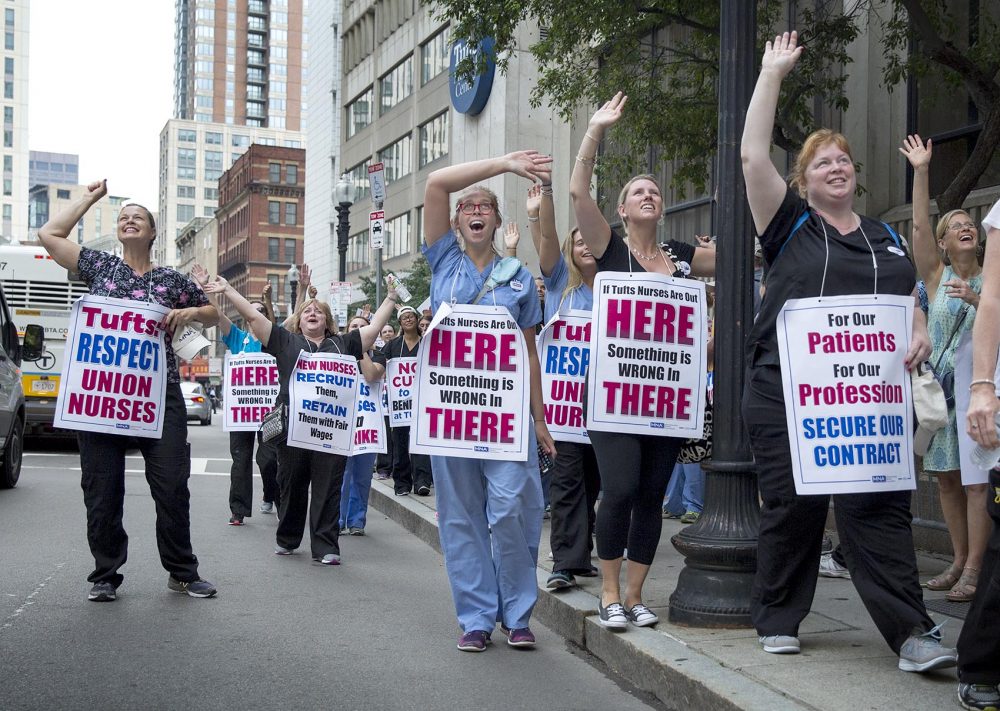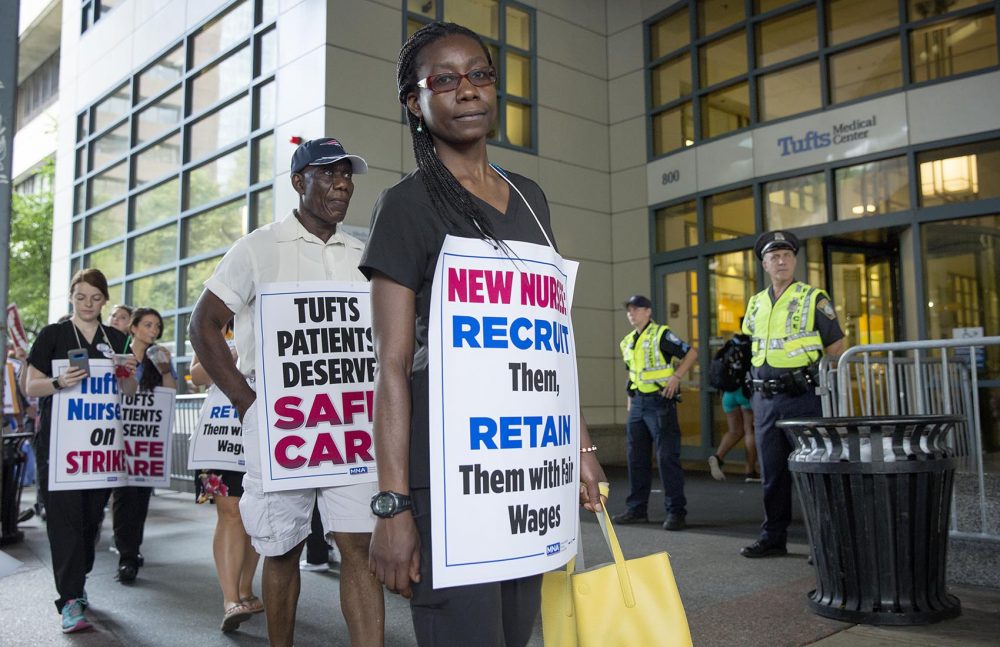Advertisement
Tufts Medical Center Nurses Go On Strike

Hundreds of nurses lined the sidewalks in front of Tufts Medical Center Wednesday in what the union says is the largest nursing strike in Massachusetts history.
It is also the first nurses strike in Boston in 30 years.
The strike began at 7 a.m. as night shift workers left their wards to form picket lines. Iron workers, builders, teachers, service employees and other union members joined the throng. Boston fire trucks, ambulances and random cars cheered them on.
The tone of the protest did not go over well inside the hospital, where a sober CEO, Dr. Michael Wagner, updated reporters.
"Outside of the organization you may see what looks like a celebration," Wagner said. "Inside this organization we’re completely focused on the work that we do every day to make sure that our patients are safe and they receive the most compassionate care."
More than 1,200 Tufts nurses planned to be out for just one day. But the hospital says anyone who didn't report for work Wednesday would be locked out until Monday morning.

"We needed to recruit nurses from around the country with the specific skill sets we need to care for our patients," said chief nursing officer Terry Hudson-Jinks. "In order to get those nurses to come in for the one day, we needed to have five days worth of schedules for them."
Tufts says it's using 320 replacement nurses, working 12-hour shifts, to maintain normal operations.
There were differing accounts about the quality of care delivered by those nurses.
Tufts Chief Medical Officer, Dr. Saul Weingart, said surgeries began later than usual by design, so that replacement nurses could get oriented. But he said that overall, everything was running smoothly.
"It feels like not just a normal day, but a particularly efficient and effective day for us," he said.
But Massachusetts Nurses Association spokesman David Schildmeier said there were numerous reports of nurses who didn't know how to use equipment or dispense medications.
Advertisement
"How can you expect 300 people from different parts of the country to function at the same level as 1,200 folks who've been doing this every day, day in, day out," Schildmeier said.
The state Department of Public Health, which had monitors inside the hospital who were authorized to intervene if they saw or were alerted to problems with patient safety, said only minor issues were reported and that the hospital addressed them quickly.
Hudson-Jinks said it was a fortuitous decision to stay open for business as usual, as the hospital was treating more than its normal volume of patients Wednesday — as were most other hospitals in the city.
"We have 60 cases booked for the OR, and guess what else, Boston health care, nearly every organization is at or above capacity," she said.
Hospital leaders said patients told them that if it weren’t for news reports, they wouldn’t know that their nurse was filling a temporary role.
Bob Kilroy, whose daughter has had heart problems for many years, says he urged her to move during the strike, but his daughter declined.
"The people who’ve been taking care of her for 17 years are out here, fighting for their jobs," Kilroy said. "I’d do anything for these men and ladies."
State Rep. Marjorie Decker and a small crowd of state politicians lashed out at Tufts administrators during an afternoon rally outside the hospital.
"How dare you put your patients at risk," she said. "If you're MEDVACing babies there, if you are doing heart transplants today, you know you are putting your patients at risk."
Wagner acknowledged that hospital leaders were feeling some heat.
"There is appropriate levels of concern being raised by the politicians, but I think they also understand very well the great challenges we face, the reductions in reimbursement, and the uncertainty at the federal level."
The union says there are three issues in dispute: wages, staffing and proposed pension changes. On wages, nurses say they are the lowest paid in Boston. Veteran nurses are frustrated by a pattern: New graduates find their first nursing job at Tufts Medical Center, they get a few years of training, then move on to one of the higher paying hospitals.
The hospital acknowledges that it pays nurses less than Brigham and Women’s Hospital, for instance, which has some of, if not the highest nursing wages in the city. But Tufts says it is paid 28 percent less per patient than the Brigham. Tufts also has a higher percentage of Medicaid patients.
Wagner says the hospital is negotiating with the union within those constraints.
"At some point, you have to let hospitals try to manage the changing world of health care delivery and do it in the most effective, compassionate, high quality way," he said.
The hospital had proposed reducing the difference in pay between top scale Tufts and Brigham nurses to 4 percent by 2020. But Tufts has cut that offer substantially because it is subtracting the cost of the strike — $6 million — from the $30 million package it offered earlier this year.
On staffing, nurses want more colleagues who can move within or between departments as needed.
Helen Keaney, who has worked in pediatrics for 39 years, says she often goes home in tears, recounting the conversations with parents she had to cut short or the babies who didn’t get enough attention.
"You could have done so much more. That bothers me, because I’m so much better than what I can be up there," she said.
The hospital claims retirement plan changes are the main unresolved issue. The hospital has been moving nurses, along with other employees, into defined contribution plans in which the hospital gives employees money they invest for retirement. But 341 nurses are still in a pension plan that guarantees a fixed payment during retirement. The hospital wants to shift these nurses to a 403(b) plan. The union says retirement for these nurses could be managed at a savings by switching to a Taft-Hartley multi-employer union plan. The hospital disagrees and says Taft-Hartley plans are too risky.
The dispute has grown bitter, with union leaders discussing strike dates and interventions aimed at hurting the hospital and creating chaos. Hospitals leaders are accusing nurses of walking out on deathly sick patients, making money their priority.
Boston Mayor Marty Walsh is urging both sides to get back to the table.
"A prolonged strike or lockout does not help Boston, does not help the patients and does not help find a resolution," Walsh said in a statement.
No new talks are currently scheduled, however.
Hospital leaders say all nurses will be welcomed back, with respect, on Monday.
The audio atop this post has been updated with the latest developments. Listen to our earlier report here.
This article was originally published on July 12, 2017.
This segment aired on July 12, 2017.
